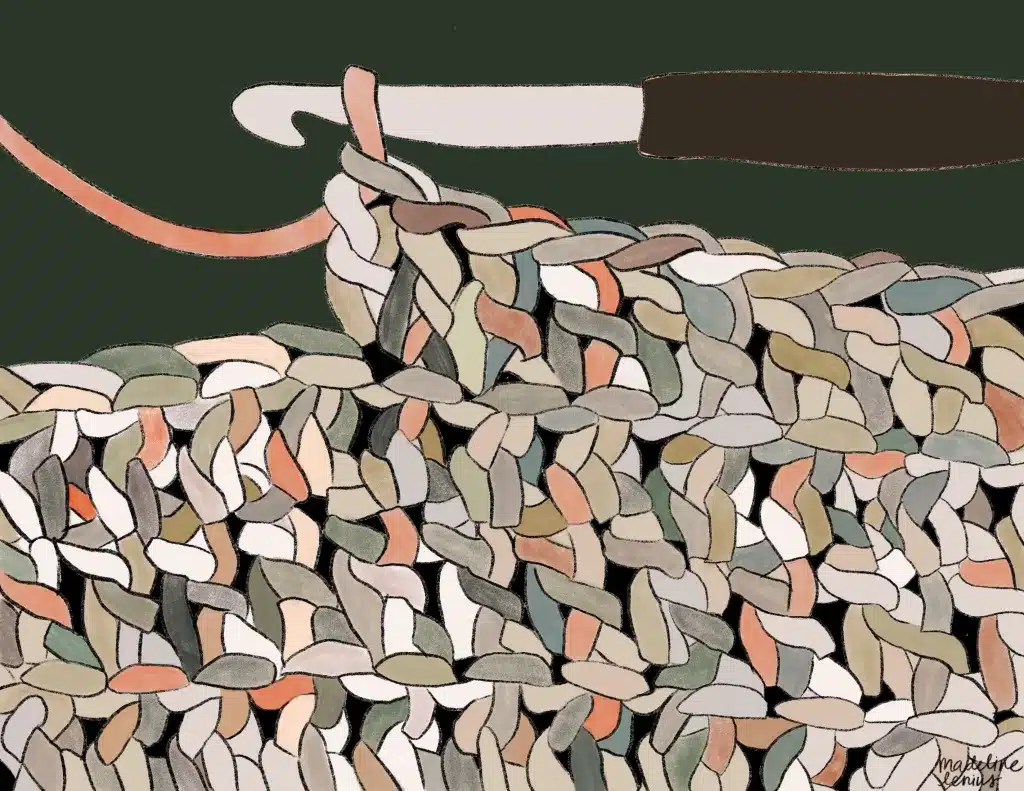
Weaving plastic into gold
Story and art by MNIPL Intern Maddie Lenius
Last winter, Trudy Dunham, a Ramsey County Recycling Ambassador, heard about a request to make sleeping mats out of recycled plastic bags for unhoused people. She attended a training session and brought the project back to the Hamline United Methodist Church Earthkeepers team. Trudy and other Hamline Church members were in the process of planning an Eco-Share event, similar to an Eco-Fair but with an emphasis on education and involvement, rather than selling products. They decided to incorporate the sleeping mat crocheting project as an interactive element.
“They had some folks making these as a sort of demonstration and they had someone there who was taking the bags and cutting them to strips, so you saw the process. They also had other tables showing how you can be more sustainable,” Lisa Chen, Hamline member and crocheting volunteer, said. “I’d been hearing about this at church, and then I finally got to see it and after I saw it I thought, ‘I can do that!’”
The Eco-Share provided a chance for volunteers to learn about this project which they have continued working on in their own homes or at group gatherings. Hamline Church has many opportunities for members to participate in small groups, many of which focus on social justice, including the Earthkeepers.
“I think most people do have a sense that the work they’re doing, yes it takes extra time, it takes effort, but the end result is a good thing and what comes out of that is not only the good work that they’re doing, but you also get to know some of the people in that group that you’re working with. It’s fun and social, we joke around,” Lisa said.
Awareness of the connectedness of humanity and all of the natural world is an important value at Hamline which inspires these leaders to take action in their community.
“I think that one of the reasons humans are on Earth is to steward each other and the plants and animals on earth, so environmental justice and taking care of people is what we’re supposed to do,” Trudy said. “Theologically, we should provide hospitality, we should ask people to be our guests, we should feed them and clothe them and everything like that. The animals and plants are necessary to nourish us, but also the whole planet, we’re an ecosystem. We’re all very interdependent. You can’t not care for a part or break it or kill it and keep a healthy whole.”
Even when the crocheters work on the mats individually, they participate in this connectedness. Being involved in community projects is a spiritual experience for many participants.
“I think about how it reinforces our solidarity, that we are one. It doesn’t come from a hierarchy, but what can I give?” JoEllen, another volunteer, said. “It’s a mutual receiving as well as giving when you crochet. Michelle Obama talks about in her book, knitting and the focus you can have. It’s a real prayerful time. So the prayer I like is: Oh great love, thank you for living and loving in us and through us. May all we do flow through our connection to you, each other, and our natural world, this day. It has a lot to do with feeling connectedness and support from that as well.”
The team is still figuring out where the completed mats will go, but the congregation has relationships with a few organizations that work with unhoused people. They will collaborate with these groups to find a local need for the mats.
“One of my values is taking care of those in the immediate proximity first,” Trudy said. “Only when you’ve taken care of your own can you then give beyond. I just don’t think you can ignore the people who are right around you on a day to day basis, the hurts and ills that are right here.”
For Trudy, JoEllen, and Lisa, taking on small projects to meet local needs is the first step in building a world that is more just for all.
“I would like us to get to the point where we don’t have people living below poverty lines. Where people don’t have to worry about where they’re going to sleep or how they’re going to get needed healthcare or get breakfast for themselves or their kids.” Trudy said. “They’re just these things that shouldn’t be an issue, we should be able to help each other and take care. And that it won’t matter what color or gender or anything else that you are in terms of having basic needs met.”
Although all of the issues facing the planet can be overwhelming, we find hope through authentic community, in our congregations, neighborhoods, and world.
“I’ve been thinking about hope. And there’s the cognitive hope that’s based on the data and the information and all that we know, and that can be a hopeless path. Because the cognitive, the data, is so hard to hear, like the hottest day in the Earth’s record this week. What do we do with that?” JoEllen said. “So, the cognitive hope, I love the creativity of our human spirit, that we can come up with creative ways to steward our environment, to learn. And affective hope is kind of the question… What’s your positive view of what you want the world to be? I’d piggy back off Trudy, it would be solidarity… that honors the inequities of where we live and the impact that our environment has on our lives…It’s a spirit of joy that is just how God has put that life in us that is just amazing, so that’s real hope.”
Do you have a story to share?
Your community's climate actions are inspiring! Share your story with others ...
